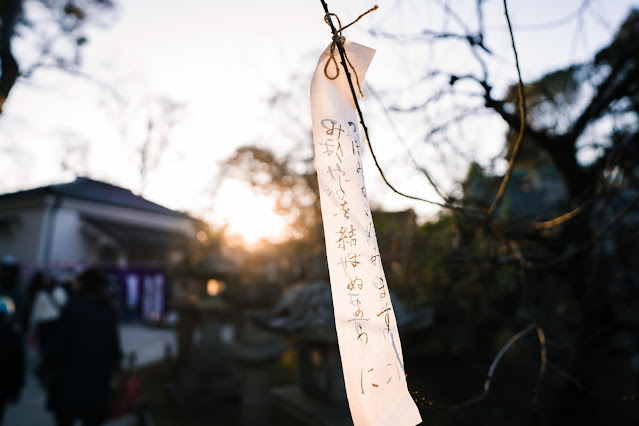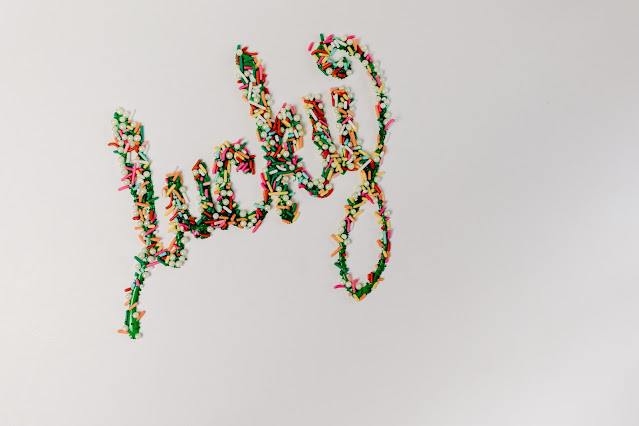Omikuji is a type of fortune-telling in Japan that involves drawing a random slip of paper from a container at a shrine or temple. The paper typically contains a written message of good or bad fortune, and people believe that the message will predict their future.
The history of omikuji dates back to the Heian period (794-1185), when divination using Chinese texts was popular among the aristocracy. During the Edo period (1603-1868), the practice spread to the common people, and omikuji became a popular form of fortune-telling.
Today, omikuji is a common practice in Japan, especially at shrines and temples. It is believed that if you receive a bad fortune, you can tie the paper to a nearby tree or wire to leave the bad luck behind. Conversely, if you receive a good fortune, you can take it home as a lucky charm.
there are several types of fortunes that can be found on an omikuji slip. Here are some common examples:
Daikichi (大吉) - the best fortune, indicating great luck and success in all areas of life
Chukichi (中吉) - a moderately good fortune, indicating that things will go well but there may be some challenges
Shokichi (小吉) - a small or minor good fortune, indicating some success but also some obstacles to overcome
Kichi (吉) - a general good fortune, indicating that things will go smoothly but not without effort
Suekichi (末吉) - a slightly bad fortune, indicating some setbacks and challenges ahead
Kyo (凶) - a bad fortune, indicating that things may go wrong or be difficult
Daikyo (大凶) - the worst fortune, indicating great misfortune or disaster
It's important to note that receiving a "bad" fortune doesn't necessarily mean that something negative will happen - rather, it's seen as an opportunity to reflect on potential challenges and prepare accordingly. Similarly, receiving a "good" fortune doesn't guarantee success, but it can serve as a source of motivation and inspiration.
Although I usually go to Meiji Jingu Shrine to get my omikuji, which Meiji Jingu Shrine (Shibuya, Tokyo) does not indicate good or bad luck, and chooses waka poems written by Emperor Meiji and Empress Shoken, along with commentary, I sometimes go to other shrines and get omikuji.
A few years ago, I went to the famous Senso-Ji temple in Asakusa, Japan and drew "bad fortune". Senso-Ji is famous for the high probability of drawing a "bad fortune" omikuji, and that was my case as well.
This year, I drew an omikuji from Meiji Jingu Shrine as usual, but because the fortune doesn't have categories of luck, I opted to get another omikuji from another place. Let's read it together!
This omikuji is divided into three sections, let's go through them one-by-one.
SECTION ONE
「玉ちはう かみの めぐみの風うけてもえ出でにけり のべの 若草」
This roughly translates to:
"Under the grace of God's wind, young grass in the field sprouts"
This can be interpreted as, "after winter has passed and the spring breeze begins to blow, the cold begins to ease, and the grass hidden beneath the ground begins to sprout." Therefore, this gives the image that a hard situation will gradually begin to turn around, or a misfortune will turn into luck.
This section is spot on for me. Winter was extremely trying this year in every sense of the meaning, but things are beginning to turn around. Things always do!
SECTION TWO
時が来れば思うままになります鏡のかげにしたがう様に心正しく行いをすなおにしないと家の内に不和が起こって災が生れます 特に男女の間をつつしめ
This roughly translate to:
When the time comes, your wishes will come true, but just as you follow the reflection in the mirror, you must act with a pure heart and sincerity. Otherwise, discord will arise within the home and disaster will occur. Especially be careful in matters between men and women.
I also believe this section is spot on for me. Living in Japan has forced me to find who I truly am and what I truly believe in, which can be hard as a foreigner because many things here go against my values, traditions, habits, and standards I acquired growing up in America. It can be especially hard being a Christian living in a non-Christian country, but I have learned that only bad things happen when you go against yourself for the sake of conformity and external harmony.
Also, I hate to sound cocky, but all my wishes have come true in life. It might not be exactly when I want it, or it might have been painful to get it, but I always get what I need. That's something I cannot deny and can only thank God for.
I think that is why it is so important for me to act true to myself because even the bad things I think come true too. So, it is important for me to act and think with more intention.
SECTION THREE
- 願望 : と, のう しかし色情につき妨起る
- Wish: Your wish will come true, but when love gets involved, obstacles arise.
- 待人 (恋人、運命の人...) : 来ずさわりあり
- Destined person: There's an obstacle preventing them from coming
- 失物 : 出にくい
- Lost/missing items: Lost items are hard to come by
- 旅行: 連れあればよろし
- Trips: If there is a companion, things will go well
- 商売 : 物価かわりなし
- Business: Prices are stable
- 学問 : 努力すればよろし
- Studies: If you put in effort, things will go well
- 相場: 売り買い変化なし
- Stocks: Stable whether buying or selling
- 争事:「言わぬがよい勝ち」
- Disputes: It is better to keep quiet than to argue
- 恋愛:よく見定めて進め
- Love: Proceed after careful consideration
- 転居: さわりなし吉
- Relocation: No problem, good fortune
- 出産: 安し 安心せよ
- Childbirth: Easy, and not to worry
- 病気: 医師にかかり信心せよ
- Sickness: Consult a doctor and have faith
- 縁談: はやく我心をさだめよ
- Marriage Proposals: Make up your mind quickly
Overall, I believe I got a really spot on fortune! Not bad, but no good, which seems more realistic. Have you ever drawn an omikuji? I'd love to hear what you think!











0 comments